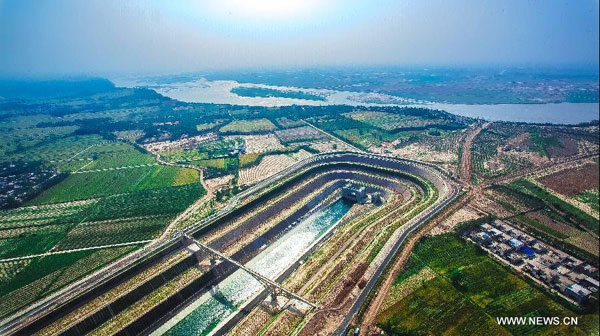


Photo taken on May 19, 2015 shows one part of the South-to-North Water Diversion Middle Route Project in Xingyang City, central China's Henan Province.[Photo: Xinhua]
About 6 billion cubic meters of water has been transferred to central and northern China as of Friday via the south-to-north water diversion project, benefiting 42 million people, officials said Friday.
According to the project's construction commission office in Beijing, tap water quality in northern municipalities of Beijing and Tianjin, Hebei Province and the central province of Henan has been improving since late 2014 when water diversion began.
Eighteen large and medium-sized cities have benefited from the project. Over 70 percent of tap water supplied to downtown Beijing is "southern water," covering more than 11 million residents.
So far, more than 200 million cubic meters of "southern water" have been stored in four reservoirs in the capital.
Every year, the middle route of China's south-to-north water diversion project carries water through canals and pipes from the Danjiangkou reservoir in central China's Hubei Province to the provinces of Henan and Hebei, as well as Beijing and Tianjin.
The water transfer project was conceived by Chairman Mao Zedong in 1952. The State Council approved the ambitious project in December 2002 after nearly half a century of debate.
 Fire brigade in Shanghai holds group wedding
Fire brigade in Shanghai holds group wedding Tourists enjoy ice sculptures in Datan Town, north China
Tourists enjoy ice sculptures in Datan Town, north China Sunset scenery of Dayan Pagoda in Xi'an
Sunset scenery of Dayan Pagoda in Xi'an Tourists have fun at scenic spot in Nanlong Town, NW China
Tourists have fun at scenic spot in Nanlong Town, NW China Harbin attracts tourists by making best use of ice in winter
Harbin attracts tourists by making best use of ice in winter In pics: FIS Alpine Ski Women's World Cup Slalom
In pics: FIS Alpine Ski Women's World Cup Slalom Black-necked cranes rest at reservoir in Lhunzhub County, Lhasa
Black-necked cranes rest at reservoir in Lhunzhub County, Lhasa China's FAST telescope will be available to foreign scientists in April
China's FAST telescope will be available to foreign scientists in April "She power" plays indispensable role in poverty alleviation
"She power" plays indispensable role in poverty alleviation Top 10 world news events of People's Daily in 2020
Top 10 world news events of People's Daily in 2020 Top 10 China news events of People's Daily in 2020
Top 10 China news events of People's Daily in 2020 Top 10 media buzzwords of 2020
Top 10 media buzzwords of 2020 Year-ender:10 major tourism stories of 2020
Year-ender:10 major tourism stories of 2020 No interference in Venezuelan issues
No interference in Venezuelan issues
 Biz prepares for trade spat
Biz prepares for trade spat
 Broadcasting Continent
Broadcasting Continent Australia wins Chinese CEOs as US loses
Australia wins Chinese CEOs as US loses